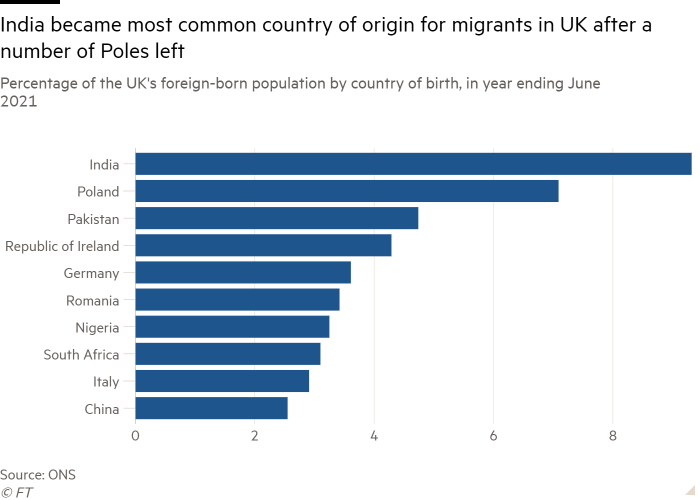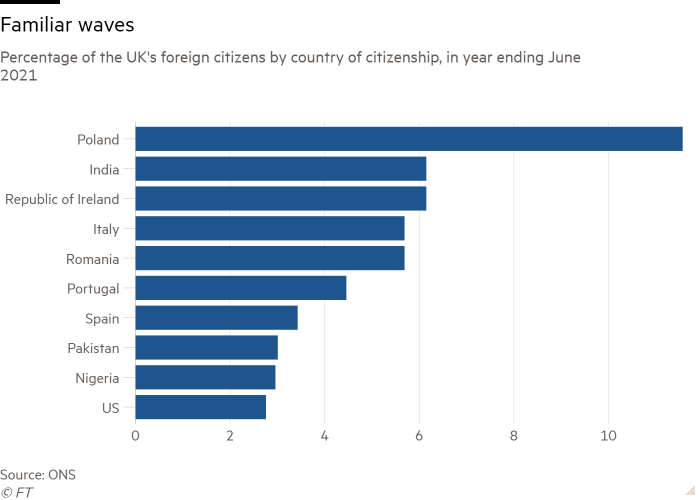This article is an on-site version of our Inside Politics newsletter. Sign up here to get the newsletter sent straight to your inbox every weekday
Good morning. Earlier this week, I wrote of my surprise that the UK’s historically high levels of immigration had not yet led to the political and social backlash that followed previous peaks.
A number of you advanced an interesting, and I think plausible, theory as to why. Some thoughts on it below.
Inside Politics is edited by Georgina Quach. Follow Stephen on Twitter @stephenkb and please send gossip, thoughts and feedback to insidepolitics@ft.com
The history of British immigration policy is of relative and in some cases complete openness followed by a political backlash and a sharp reduction in people’s right to come to the UK. I wrote earlier this week that I thought this pattern would probably continue, and that the attempt by successive Conservative governments to avoid this by pairing relatively easy movement with draconian curbs on refugees and the dependants of overseas students would prove no more effective than a similar policy mix by New Labour.
A lot of you thought I was missing something quite important: novelty!
Ultimately, the arrival of people such as my great-great-great grandparents from the Russian empire in the 19th and early 20th centuries was a big deal, culturally and socially. It changed the make-up of the country, and of the East End of London and other coastal cities in particular.
Ditto, so too was the arrival of people such as my grandparents from South Africa and Zimbabwe in the 1960s, my school friends’ grandparents from the Indian subcontinent, and people from the former eastern bloc in the 2000s.
These were big cultural changes. They meant a lot in terms of the food available in the shops, the local customs, the languages spoken in major cities, and so on. Unsurprisingly, I think these were positive changes in the long-run — but certainly they were of great significance.
Is today’s migration as significant? Well, a glance at data from the annual population survey by the Office for National Statistics, analysed last year by the University of Oxford’s migration observatory, suggests perhaps not.


In terms of what it means to be British today, as well as the food in the shops, the local restaurants and the languages spoken in our major cities, this list of countries is very old news.
The UK’s immigration system means that in practice almost everyone who comes to the UK does so in possession of a job offer or a university place. Combined with the fact most students and overseas workers come from countries that have longstanding ties to the UK and existing communal networks, why would we expect this round of immigration to have anything like the social or political effects we’ve seen in the past?
Now there are two countries that make up a hefty chunk of this year’s figures: Hong Kong and Ukraine (see our write-up here). As these two excellent pieces about the experience of Hongkongers in the UK by Alexandra Goss and our own Georgina Quach demonstrate, we are not talking about a population that requires an awful lot of government help to integrate in the UK, though individual cases differ.
The challenges faced by Ukrainian refugees are more complicated. It helps that the Ukrainian cause is very popular in the UK — I am yet to visit a constituency and not see at least one visible sign of support for Ukraine, be it a bumper sticker, a flag in a window or flying from a chimney — but this does represent a bigger potential change to the UK. It may be, as the Homes for Ukraine scheme unwinds, that we see a return to something a lot more like previous waves of anti-immigrant sentiment in the country.
For the most part, many of the arrivals are doing what most new migrants tend to do: seeking to live in areas where there is already a pre-existing diaspora presence that is fairly well-integrated into local areas. As people move into less historically diverse areas, that may change.
But as John Burn-Murdoch’s rich research into the societal differences between the US and Britain this week demonstrates, the UK has a pretty good story to tell as far as integration goes.
I don’t know if this explanation is right, and, as I say, it’s possible that events may mean we do see a return to some of the political fissures of the past. But I am saying that as we debate the UK’s high net migration figures and what Rishi Sunak and Keir Starmer should do next, we should at least consider the possibility that maybe the fact so many people with jobs, university places and family ties to the UK still want to come here is something worth celebrating, not fretting over.
Now try this
I’ve just devoured Linda Grant’s latest novel, The Story of the Forest, an engrossing family saga that spans Latvia to Liverpool and the best part of a century. It’s a truly terrific book — with a beautiful cover, which I know ought to be a secondary concern, but, nonetheless, is an added delight. Don’t just take my word for it: Catherine Taylor thought it was brilliant too. Read her review here.
However you spend it, have a wonderful weekend. Inside Politics will be back on Tuesday.














